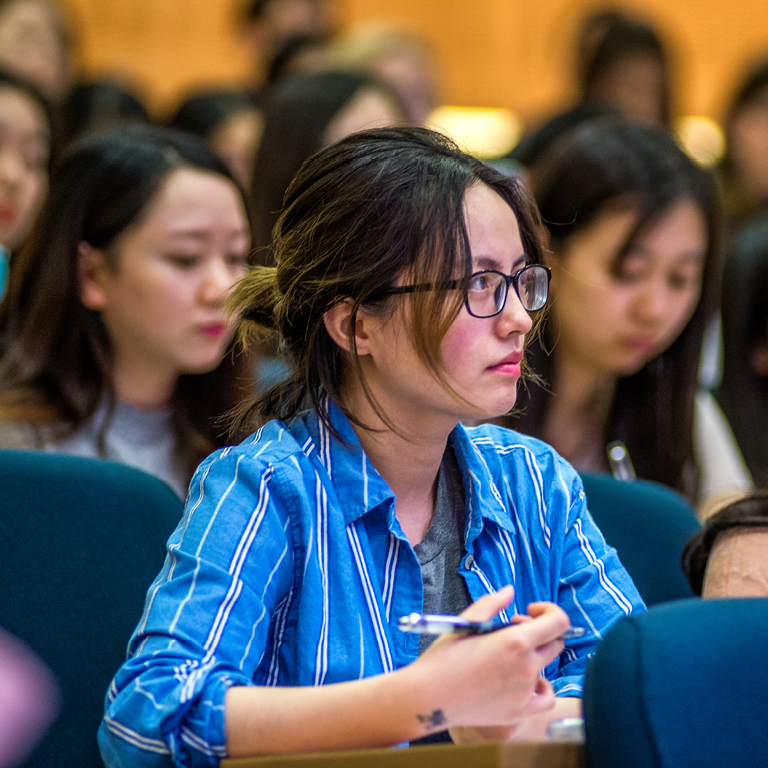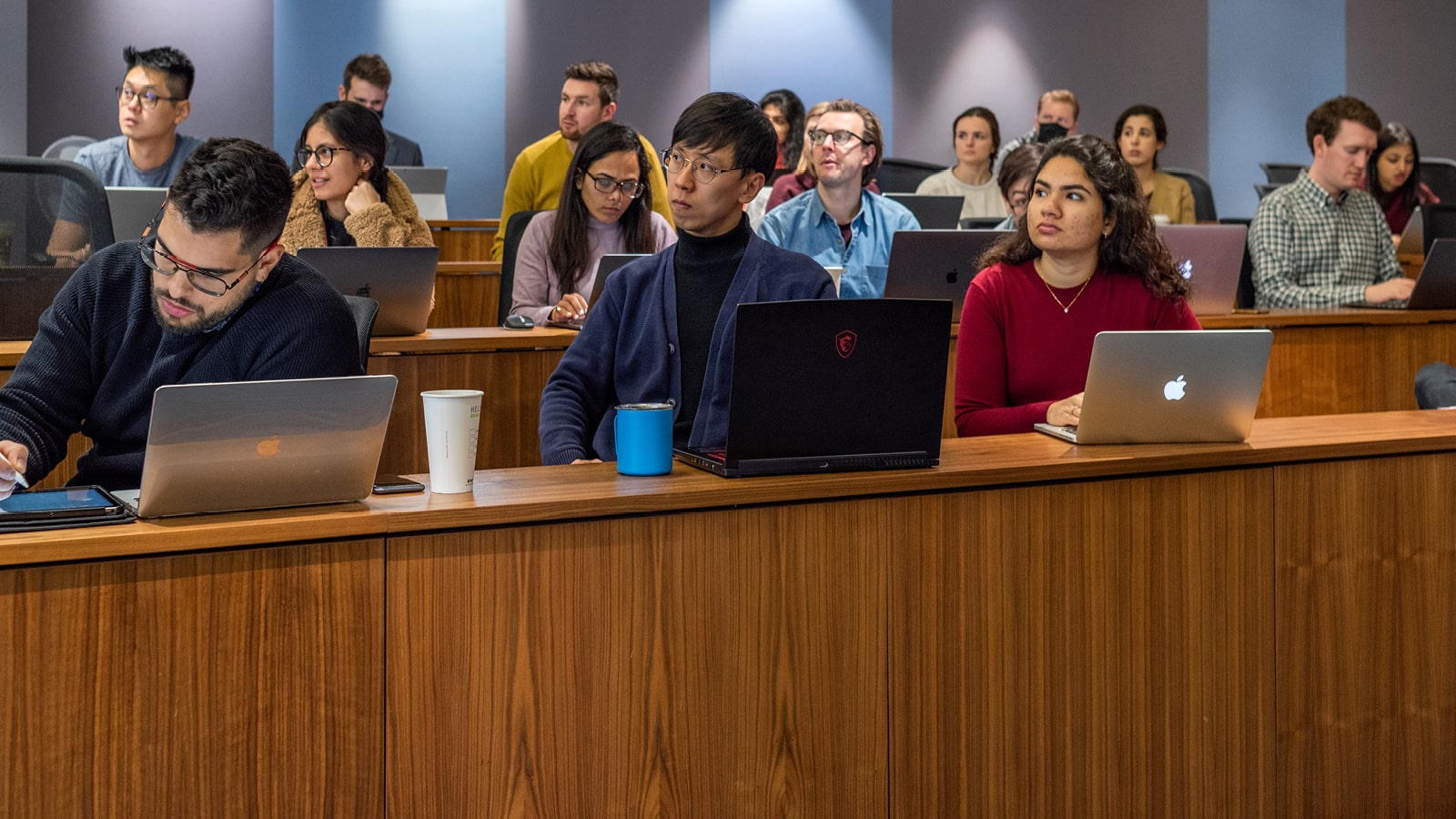Marketing Strategy and Innovation MSc

Key information
Duration: 12 months
Attendance mode: Full-time
Fees: £31,000 (more information)
Location: Bunhill Row
Start of programme: September 2024
Application deadline: Rolling applications
Entry year: Showing course information for 2024
Close industry links to start-ups and major brands. Previously we've worked with Visa and Unilever
Overview
Marketing Strategy and Innovation MSc Who is it for?
Some people equate marketing with advertising. You know that marketing is a multi-faceted business process involving creativity and innovation alongside analytical and strategic skills. The MSc Marketing Strategy and Innovation course is perfect for you if you have an appreciation of marketing. Now you want to make it your career or find out how to take your business to the next level.
The strategic marketing master's course is specifically designed for you if you have little or no previous work or study experience of marketing. Our marketing master's course will qualify you for your first professional marketing position, even if you studied fine arts, medicine, business or physics.
If you already have advanced marketing knowledge, please take a look at our other MSc courses or our MBA programmes.
Why choose this course?
- Apply your learning in a strategy simulation game
- In a business pitch to a jury of London marketers and investors
- And in a launch marketing plan for a London start-up
- Choose your topics, tailor your course to your ambitions
- Opt for a business research project or electives, including international options
- Use cutting-edge tech, generative AI applications and 3D printers.
Course objectives
Our master’s in Marketing Strategy and Innovation gives you a sound understanding of the principles and state-of-the-art practices of marketing. This postgraduate degree aims to equip you with rigorous theoretical and practical knowledge of professional marketing practice, the quantitative and qualitative analytical skills required to make complex marketing decisions, soft skills to influence people and organisations such as team-working, communications and leadership.
Explore how to innovate and create a buzz about new launches. Gain the latest knowledge on customer analysis, advertising, digital and social media marketing, fashion brand management, storytelling, sponsorship and other current topics. Through subjects including ethics and corporate social responsibility, reflect on the impact of your own work and that of the industry.
You’ll learn through interactive classes, case discussions, lectures from leading marketers and hands-on projects, including working with local start-ups, developing and pitching a business idea, and connecting with some of London’s finest senior marketers.
This marketing degree aims to equipping you with the most rigorous theoretical and practical knowledge of professional marketing practice, with the quantitative and qualitative analytical skills required to make complex marketing decisions, and with the soft skills to influence people and organisations through creativity, persistence, team-working, communication skills, leadership, and initiative.
 "The MSc in Marketing Strategy and Innovation offers a very structured and smart curriculum that emphasises complex marketing and modern trends such as digital transformation as well as human value. Don't doubt whether what you learn is useful, believe me it will be!"
"The MSc in Marketing Strategy and Innovation offers a very structured and smart curriculum that emphasises complex marketing and modern trends such as digital transformation as well as human value. Don't doubt whether what you learn is useful, believe me it will be!"
- Xueying Gigi Wang
Teaching staff
The teaching staff on the MSc in Marketing Strategy and Innovation programme are leading researchers in their fields who create new knowledge and tools for ever more effective marketing. Many academics also look back at years of practical industry experience. Most courses are also enriched through guest lectures of leading London marketers, some of which have contributed to running the world’s most iconic brands.
In the highly interactive lectures of the Bayes MSc in Marketing Strategy & Innovation programme you will tap into this wealth of knowledge and experience, and thus build your own skill as a marketer.
Course director

- Professor Fleura Bardhi
- Dr Daniela Cristian
- Dr Sabrina Gottschalk
- Dr Jay Jung
- Dr Irene Scopelliti
- Dr Janina Steinmetz
- Dr Ruben van Werven
- Dr Wanqing Zhang
- Dr Joyce Jingshi Liu
- Dr Aleksandrina Atanasova
Regular guest speakers in the program include:
- Jon Goldstone - former Marketing VP at PepsiCo and Unilever, now global brand consultant at the brandgym.
- Simon Callender - Creative Planning Director at customer experience agency Initials, London.
- Michael Rocha - Global Director Brand, Business Valuation at Interbrand, London.
Course content
The degree is aimed at equipping you with the most rigorous theoretical and practical knowledge on professional marketing practice, with the quantitative and qualitative analytical skills required to make complex marketing decisions, and with the soft skills to influence people and organisations through creativity, persistence, team-working, communication skills, leadership, and initiative.
Marketing is a fast-moving field. Therefore, each module is constantly updated to include the latest digital and analogue technologies (some of them developed by our very own lecturers) which enables you to devise path-breaking products and persuasive communication strategies in fast-changing social environments.
Course structure
Induction weeks
This MSc course starts with two compulsory induction weeks where you will get to know your new classmates and lecturers, learn how to collaborate effectively in multicultural teams, refresh your computer skills, meet Bayes’ careers services, and attend a careers fair.
Term 1
Marketing Fundamentals
Marketing is one of the most fundamental, most complex, and possibly also most misunderstood functions of the firm. The aim of this module is to introduce you to the fascinating world of marketing and provide you with a sound understanding of its central tools.
This module assumes no previous knowledge of marketing and will give you an overview of the basic marketing planning process including segmentation, branding, pricing, distribution, and promotion. These concepts are brought to life though interactive lectures, integrated projects, and industry guest speakers.
Marketing Strategy and Practice
The objective of the module is to enhance skills in strategic thinking in marketing and developing and presenting marketing plans.
This will specifically require forming objectives, situation (SWOT) analysis, market research and forecasting, target market selection, market mix strategy formation, marketing tactics development, and control procedure formulation.
In addition, you will practically apply marketing theory. You will take part in a business simulation. In this simulated world, you and your team have been recruited as Marketing Managers for a division of a large diversified firm.
Marketing strategy is your main area of responsibility, but you will also be concerned with financial matters, production planning, and R&D. You will have to integrate these various dimensions of business strategy into a long-term perspective in order to gain an edge on the competition.
At the end, we can see how your decisions have affected your market share, your profitability, and your share price.
Creativity. Innovation. Design
Incorporating the cutting-edge use of 3D printers and generative AI applications, this module empowers students to produce tangible 3D prototypes of their imaginative concepts. As design thinking becomes an increasingly pivotal aspect of modern organisations, this course offers both theoretical insights and hands-on skills. Students are encouraged to align their innovative ideas with the United Nations' sustainable goals, aiming to address and solve pressing global challenges. Through creativity, innovation workflows, and design principles, learners will be equipped to make their offerings—whether products or services—not only useful, usable, efficient, and effective but also solutions that contribute positively to the world.
Essentials of Accounting and Finance
Regardless of your eventual job title or function, a sound understanding of monetary flows and financials within an organisation is important. This module provides an overview of the core principles of financial reporting and managerial accounting. There will be an emphasis on how financial statements are compiled and how they should be interpreted. In addition, you will also get a flavour of key areas for consideration when making investment decisions.
Market Research
This module introduces you to the techniques and processes of understanding markets and gaining consumer insights. The focus of this module will be on both quantitative and qualitative approaches to studying markets and consumers and their value for innovations and marketing strategy.
This module also provides methodological tools that are fundamental to craft and management of research projects based on empirical (quantitative or qualitative) data. You will learn about traditional quantitative methods, such as surveys and interviews, and more novel approaches, such as Big Data approaches, neuromarketing, crowdsourcing, etc.
The aim is to enable you to evaluate and buy market research from clients, and be able to understand and use research output for solving marketing problems.
Term 2
Analytical Methods for Marketing
In this module, you will learn the most relevant and up-to-date quantitative methods for analysing data related to various aspects of marketing, but also running a business more broadly. Mastering these methods will allow you to improve the quality of your decisions by grounding them in empirical insight rather than intuition or gut feeling. You will learn how to develop research questions, analyse data with different methods, and draw inferences, always with a view to making better marketing decisions.
Consumer Behaviour
Via a series of lectures, case studies and in-class activities, you will be introduced to foundational psychological, sociological and cultural theories to understand behaviour of individuals in the market. The goal is to help you understand how to segment and target your market, and then, how to relate and foster a desirable behaviour from your customers.
The coursework of this module is integrated with the modules Digital Marketing and Social Media as well as Brand Management and Communication Strategies. This integrated project gives you the unique opportunity to develop and pitch a customer analysis, brand strategy, and advertising campaign across all media to a group of experienced London marketers and investors.
Brand Management and Communication Strategies
When you work as a marketer, your "brand" will be the focal point of all your thoughts and actions. Why? Because the brand gives the entire organisation purpose and direction.
The brand guides your company’s product and pricing decisions, store designs, advertising narratives, and many other important decisions. This module introduces you to the key branding theories and branding models that are used in practice. You will learn how to create, reposition, and extend a brand, and how to advertise it effectively to your target audiences.
Digital Marketing and Social Media
In practice, digital marketing often revolves around driving more traffic to a company’s pages, no matter what. However, social media and viral marketing, search engine marketing, e-mail marketing, banner advertisements, or pay-per-click (to name just a few instruments) are not the same as traditional media such as print and television, where such a focus on „more traffic“ made sense. Digital marketing is different, and much more powerful. It is a two-way street, where marketers interact with consumers, select traffic rather than accumulate it, and thus build consumer-brand relationships of different kinds. This module teaches you a range of state-of-the art tools and theories of how to use social media effectively to achieve your branding and communication goals
Term 3
All students complete two core modules (Product Innovation Management and Technology and Marketing) in term three.
Product Innovation Management
In contemporary society, organisations that do not continuously innovate will be left behind by the market. Yet, many large organisations do not manage to be innovative. This is in part due to the risky nature of product development – a huge number of new products never see the commercialisation stage, and many others fail to ‘grab’ customers’ attention – but also has to do with the nature of large organisations, which typically are not places where creative and entrepreneurial behaviour is encouraged.
In Product Innovation Management, we will focus on the challenges that innovation managers face. After evaluating their product portfolio, they might conclude that there are gaps. In that case, there is a need to add innovative new products. But many large corporations are not the most innovation-friendly environment. So innovation managers may need to consider creating a designated corporate entrepreneurship unit, changing the organisational culture, or setting up systems and processes that stimulate entrepreneurship. Through discussing these challenges, you will gain insight into how large organisations (should) manage their entrepreneurial activities.
Technology and Marketing: Engaging the Future
How does the marketing of technology shape the future world we will be living in? When will drones be delivering your Amazon orders? Will the Uber of tomorrow be a driverless car? Have you thought about having your childhood pet cloned, but with pink fur? Will you be touring your new house as augmented reality before you build it? Will a robot butler be serving you breakfast in bed? Technological advancement is opening astounding prospects for the future and marketers are challenged to catch up.
This module teaches key theories to understand what technology is, and introduces you to the latest technological developments as opportunities to create, communicate, and deliver value to consumers. The module also addresses the ethical, societal implications of new technologies and what they mean for marketers.
You can then choose to take either a Business Research Project or three electives.
Business Research Project
The Business Research Project offers an opportunity to develop your expertise and become an expert on a marketing topic of your choice.
You can, for example, conduct an independent academic research study in the subject field of your supervising Professor (e.g. running a consumer psychology experiment, collecting interview data for a consumer culture study, running a survey study on a marketing management topic).
This is the best route if you are playing with the idea of becoming an academic, but also if your goal is to work with data.
You can also develop a marketing research study with a company that faces a practical marketing problem. Our alumni office can help you open doors to get you in touch with a company to collaborate with.
You can use this format to build relationships with an organisation you might want to work for. It gets you a foot in the door and can lead to permanent employment once you have completed the MSc.
Electives
- Driving Supply Chain Innovation through Technology
- Ethics, Society and the Finance Sector
- Family Business
- Fashion Brand Management
- FinTech -Financial Services in the Digital Age
- Managing People
- Negotiation Skill for Multidiscipline Managers
- New Market Creation
- Practicing Management in the Digital Age
- Project Leadership
- Project Management
- Retail Supply Chain Management
- Storytelling for Business.
International electives
- Corporate Open Innovation (Rome)
- Luxury Marketing Strategy (Paris)
- Start ups: International Field Trip (Lisbon).
Please note that an elective may not be offered if it is not selected by a minimum number of students, or might be overbooked. Please also note that international electives may be taught in alternate locations, depending on availability.
Download course specification:
Marketing Strategy and Innovation MSc [PDF]Assessment methods
Term dates
Term dates 2024/25
- Induction: 9th September 2024 - 20th September 2024
- Term one: 23rd September 2024 - 6th December 2024
- Term one exams: 6th January 2025 - 17th January 2025
- Term two: 20th January 2025 - 4th April 2025
- Term two exams: 21st April 2025 - 2nd May 2025
- Term three - international electives: 5th May 2025 - 16th May 2025
- Term three: 19th May 2025 - 4th July 2025
- Term three exams: 7th July 2025 - 18th July 2025
- Resits: 11th August 2025 - 22nd August 2025
- Additional resit week - tests only: 25th August 2025 - 29th August 2025.
Timetables
Course timetables are normally available from July and can be accessed from our timetabling pages. These pages also provide timetables for the current academic year, though this information should be viewed as indicative and details may vary from year to year.
Please note that all academic timetables are subject to change.

Fees & funding
UK/Home/International fee
September 2024 entry
£31,000
MSc
Tuition fees are subject to annual change.
Deposit: £2,000 (usually paid within 1 month of receiving offer and non-refundable unless conditions of offer are not met).
First installment: Half fees less deposit (payable during on-line registration which should be completed at least 5 days before the start of the induction period).
Second installment: Half fees (paid in January following start of course).
Scholarships & bursaries
Scholarships, sponsorships, loans and other funding could support your education at Bayes Business School.
Learn about the cost of living as a Bayes student in London.
Scholarships
We have a range of scholarships for Master's degrees at Bayes Business Scool. Most scholarship applications for 2024/25 year of entry will open in January 2024.
View our scholarships and fundingOther funding opportunities
Scholarships are very competitive, you may wish to look other options for funding, including the government PG Loan.
View other funding optionsSponsorship
Students on the course who are sponsored in full or in part by their employer will need to complete a sponsorship form as part of the application process.
View our sponsorship guidanceCareers
Your MSc prepares you to enter the world of marketing as an excellent marketer and responsible leader. You can expect to work as a marketing manager, campaigns manager or consultant, or find roles in business strategy, SEO consulting or influencer marketing. You may wish to start your own business, or return to innovate and expand in your existing business.
You’ll be supported from the start by our careers team, with workshops, careers fairs, networking events and individual advice on your career goals and interview skills.
Class of 2022
Recent graduates have secured positions and job titles such as:
- Product Manger
- Account Executive
- Optimisation Executive
- Digital Marketing Specialist
- Strategy & Insight Assistant
- Brand Manager
- Growth Project Analyst
(Data provided from alumni who completed the annual destination data survey for 2021/22)
Download our latest MSc Employment Report
Recent employers
Alumni stories
Entry requirements
- A UK upper second class degree or above, or the equivalent from an overseas institution
- We accept applications from all academic backgrounds
- Work experience is not a requirement of this course.
Candidate profile
- This course is designed as a conversion course for students with little or no marketing education and experience
- If you have studied some marketing a while ago, or have worked in a junior marketing position, taking this course will help you move ahead
- If you have specialised in marketing during your Undergrad studies, you are welcome to study this degree, but please be aware that some contents may look familiar
- If you have worked in strategic marketing positions for more than three years, please take a look at our MBA programme, which will be more suitable
- The MSc in Marketing Strategy & Innovation is not a highly quantitative course as it is open to graduates from a variety of disciplines, but it still teaches some maths and statistics.
Interview
Applicants selected by the Admissions Panel may be invited to an online interview. We will contact all selected applicants with full instructions after the Admissions Panel has made an initial assessment of your application.We strongly advise you to provide us with your own personal email address when applying to avoid missing interview deadlines.
English language requirements
If you have been studying in the UK for the last three years it is unlikely that you will have to take an English language test.
If you have studied in the UK at degree level for less than three years (e.g. 3+1, 2+1, 2+2, etc.) you will be required to provide the results of an approved English language test and possibly resit the test to meet our academic entry requirements.
Full list of approved English language tests/qualifications and minimum requirements.
Apply
Please see our Application Guide for details of the documents you will need to supply as part of your application, and other useful information.
We cannot comment on individual eligibility before you apply. We can only make a decision on your application once it is fully complete, with all requested information received.
Frequently asked questionsTerms and conditions
Students applying to study at Bayes Business School are subject to City, University of London's terms and conditions.
Student life
We are located right in the heart of London. Being a student at City allows you to take advantage of all that London has to offer.
London is continually ranked as one of the 'Best Student Cities' in the world to study within (QS, 2019).
-
Have a question about student experience at Bayes?
Talk one-on-one with a student who is currently studying at Bayes.
Contact us
Speak to one of our staff from Master's programmes teams.











